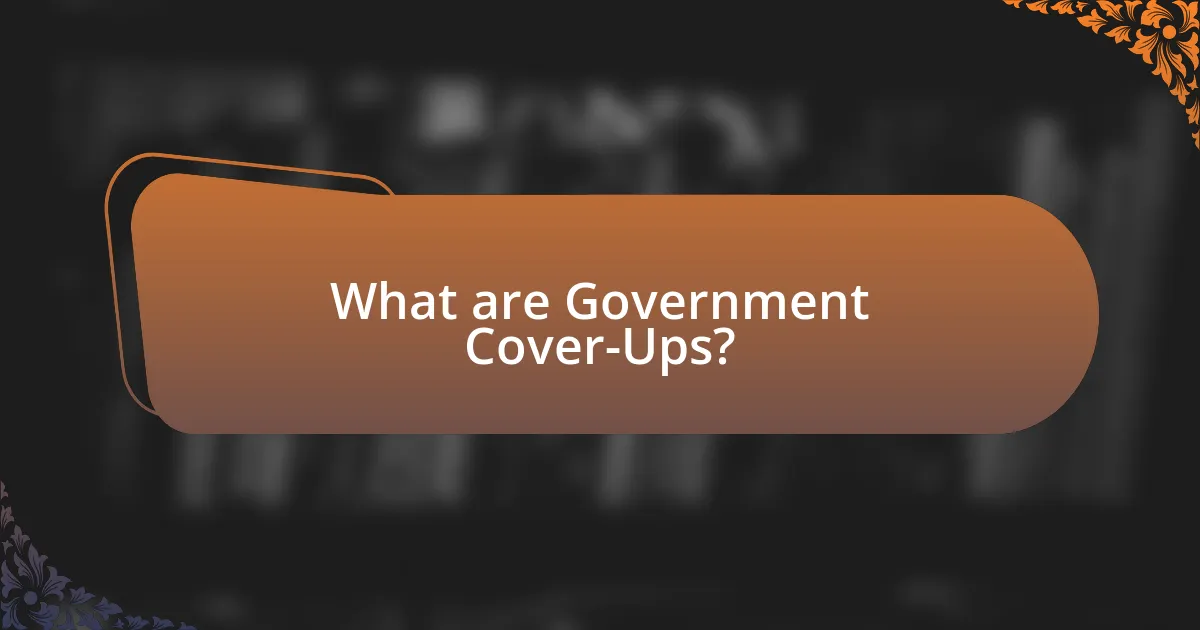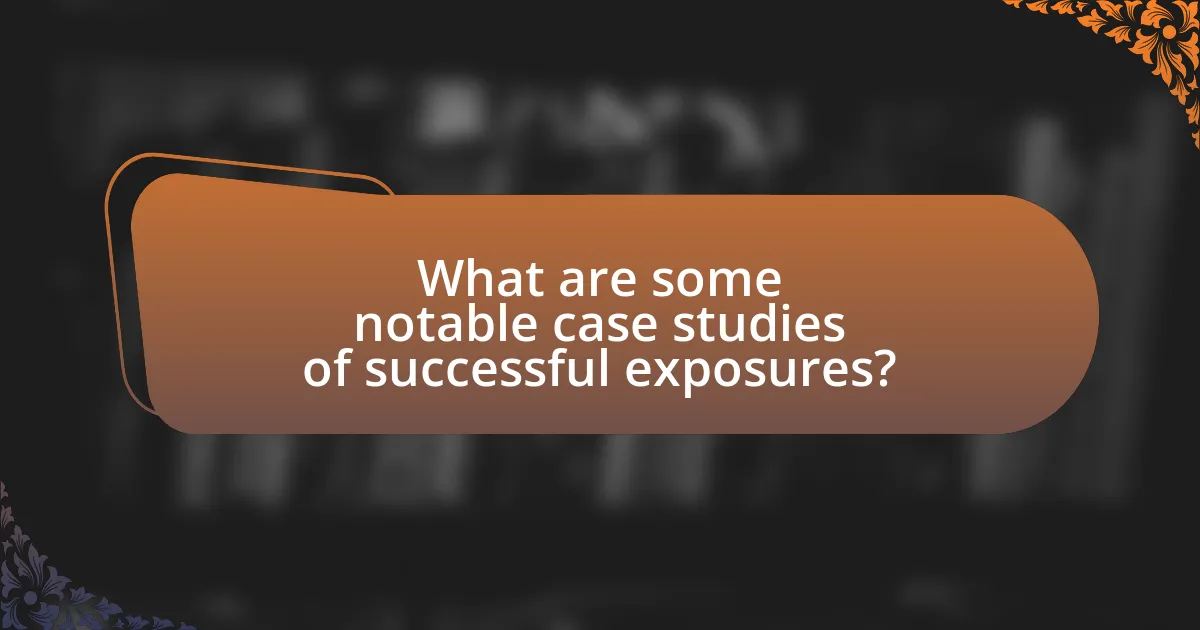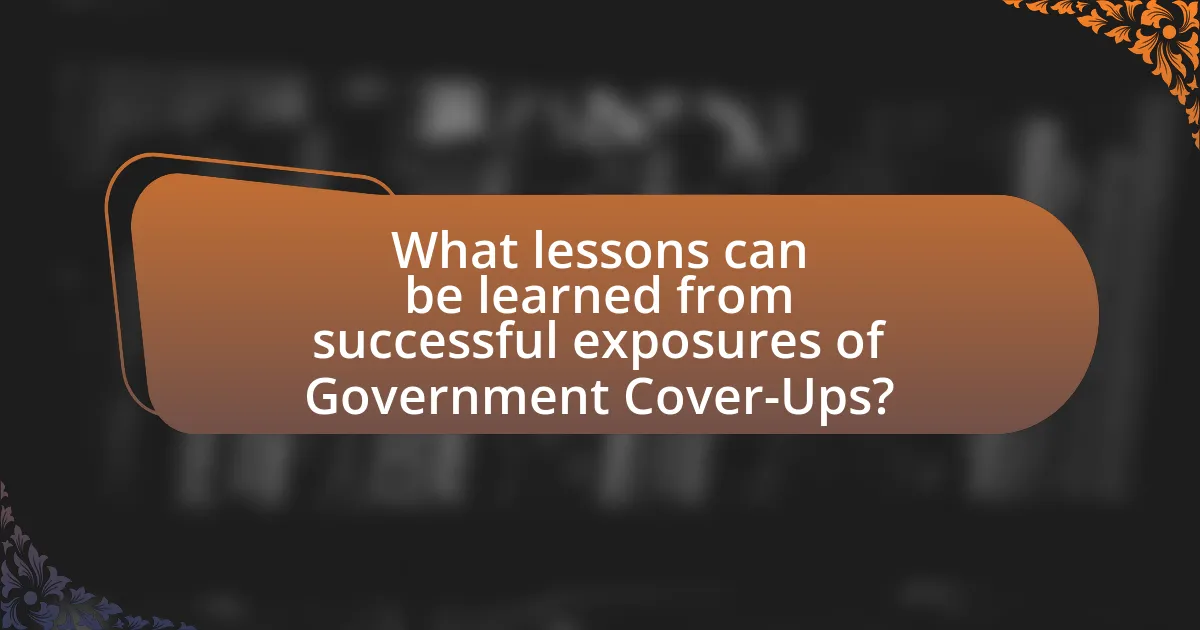Government cover-ups refer to intentional efforts by authorities to conceal information or actions from the public, often involving unethical or illegal activities. This article examines notable case studies of successful exposures, such as the Watergate scandal and the Pentagon Papers, highlighting the role of investigative journalism and whistleblower protections in revealing government misconduct. It discusses the motivations behind cover-ups, the key players involved, and the societal impacts of these actions, emphasizing the importance of transparency and accountability in governance. Additionally, the article outlines best practices for future investigations and the ethical considerations necessary for uncovering hidden injustices.

What are Government Cover-Ups?
Government cover-ups are deliberate efforts by authorities to conceal information or actions from the public, often involving illegal or unethical activities. These actions can include withholding evidence, manipulating data, or spreading misinformation to protect the interests of the government or its officials. Historical examples, such as the Watergate scandal in the 1970s, illustrate how government cover-ups can lead to significant political consequences when exposed, highlighting the importance of transparency and accountability in governance.
How do Government Cover-Ups occur?
Government cover-ups occur when officials intentionally conceal information or actions from the public to protect interests or maintain control. This often involves the manipulation of data, suppression of evidence, or dissemination of false narratives. Historical examples include the Watergate scandal, where the Nixon administration attempted to hide its involvement in a break-in at the Democratic National Committee headquarters, leading to significant political fallout and eventual resignation. Another instance is the Tuskegee Syphilis Study, where the U.S. Public Health Service misled African American men about their treatment for syphilis, resulting in long-term health consequences and a breach of ethical standards. These cases illustrate how government entities may prioritize secrecy over transparency, ultimately leading to public outrage and demands for accountability.
What are the common motivations behind Government Cover-Ups?
Common motivations behind government cover-ups include the desire to maintain national security, protect political interests, and avoid public panic. Governments often conceal information related to sensitive military operations or intelligence activities to safeguard national security, as seen in the Pentagon Papers, which revealed the U.S. government’s misleading information about the Vietnam War. Additionally, political interests drive cover-ups to protect officials from scandals or accountability, exemplified by the Watergate scandal, where the Nixon administration attempted to hide its involvement in a break-in. Lastly, governments may suppress information to prevent public panic, such as during health crises, where transparency could lead to widespread fear and unrest.
Who are the key players involved in Government Cover-Ups?
Key players involved in government cover-ups typically include government officials, intelligence agencies, military personnel, and sometimes private contractors. Government officials, such as politicians and bureaucrats, often orchestrate or facilitate cover-ups to protect their interests or maintain public order. Intelligence agencies, like the CIA or NSA, may engage in covert operations that require secrecy, leading to potential cover-ups. Military personnel can also be involved, especially in cases related to national security or classified operations. Additionally, private contractors may assist in these efforts, providing services that help conceal information. Historical examples include the Watergate scandal, where members of the Nixon administration were implicated, and the Iran-Contra affair, involving officials from the Reagan administration.
Why is it important to expose Government Cover-Ups?
Exposing government cover-ups is crucial for maintaining transparency and accountability in governance. When cover-ups are revealed, they often lead to public awareness and scrutiny, which can result in policy changes and reforms. For instance, the Watergate scandal in the 1970s exposed serious abuses of power within the U.S. government, leading to significant political consequences, including the resignation of President Nixon. This case illustrates how exposing such actions can restore public trust and ensure that government officials are held accountable for their actions.
What impact do Government Cover-Ups have on society?
Government cover-ups significantly erode public trust in institutions and can lead to widespread skepticism about official narratives. When citizens discover that their government has concealed information, such as in the Watergate scandal, it fosters a belief that authorities are untrustworthy, which can diminish civic engagement and increase political apathy. Historical evidence shows that the exposure of cover-ups often leads to social movements demanding transparency and accountability, as seen in the aftermath of the Pentagon Papers, which revealed government deception regarding the Vietnam War. This societal impact underscores the importance of transparency in governance and the potential for public backlash against perceived injustices.
How do successful exposures contribute to accountability?
Successful exposures contribute to accountability by revealing misconduct and prompting corrective actions from authorities. When information about government cover-ups is disclosed, it often leads to public scrutiny and demands for transparency, which can result in investigations and policy changes. For instance, the Watergate scandal exposed abuses of power within the U.S. government, leading to the resignation of President Nixon and significant reforms in campaign finance laws. This illustrates how successful exposures not only hold individuals accountable but also foster systemic changes that enhance governmental integrity.

What are some notable case studies of successful exposures?
Notable case studies of successful exposures include the Watergate scandal, where investigative journalism led to the resignation of President Richard Nixon in 1974, revealing extensive abuse of power and corruption within the U.S. government. Another significant case is the Pentagon Papers, published by The New York Times in 1971, which disclosed classified documents about the Vietnam War, demonstrating government deception regarding U.S. involvement. Additionally, the Iran-Contra affair in the 1980s exposed illegal arms sales and covert operations by the Reagan administration, leading to congressional investigations and public outcry. Each of these cases illustrates the critical role of whistleblowers and investigative reporting in uncovering government misconduct.
How did investigative journalism play a role in these exposures?
Investigative journalism was crucial in exposing government cover-ups by uncovering hidden information and holding authorities accountable. Journalists employed rigorous research, interviews, and data analysis to reveal discrepancies and misconduct, as seen in the Watergate scandal, where reporters Bob Woodward and Carl Bernstein of The Washington Post uncovered a complex web of political corruption, leading to President Nixon’s resignation. Their work exemplified how investigative journalism can illuminate truths that those in power seek to conceal, thereby fostering transparency and public awareness.
What techniques were used by journalists to uncover the truth?
Journalists used investigative techniques such as source verification, document analysis, and whistleblower interviews to uncover the truth. Source verification involves cross-checking information from multiple reliable sources to ensure accuracy. Document analysis includes scrutinizing public records, government documents, and leaked materials to find inconsistencies or hidden information. Whistleblower interviews provide firsthand accounts of wrongdoing, often revealing critical insights that are not accessible through traditional reporting methods. These techniques have been pivotal in exposing government cover-ups, as seen in cases like the Pentagon Papers, where journalists relied on leaked documents to reveal the truth about U.S. involvement in Vietnam.
What challenges did journalists face during these investigations?
Journalists faced significant challenges during investigations of government cover-ups, primarily including threats to their safety, legal obstacles, and difficulties in obtaining information. These challenges often stemmed from government entities attempting to suppress information, leading to intimidation tactics against reporters. For instance, in high-profile cases like the Pentagon Papers, journalists encountered legal threats and potential imprisonment for publishing classified information. Additionally, access to crucial documents was frequently restricted, complicating the investigative process. These factors collectively hindered journalists’ ability to uncover the truth and report effectively on government misconduct.
What legal frameworks support the exposure of Government Cover-Ups?
Legal frameworks that support the exposure of government cover-ups include the Freedom of Information Act (FOIA) in the United States, which allows individuals to request access to federal agency records, thereby promoting transparency. Additionally, whistleblower protection laws, such as the Whistleblower Protection Act, safeguard individuals who disclose information about government misconduct, encouraging the reporting of cover-ups. The First Amendment also plays a crucial role by protecting freedom of speech and the press, enabling journalists to investigate and report on government actions. These frameworks collectively facilitate accountability and transparency in government operations, as evidenced by successful cases like the Pentagon Papers, which were revealed through legal challenges and whistleblower disclosures.
How do whistleblower protections facilitate successful exposures?
Whistleblower protections facilitate successful exposures by providing legal safeguards that encourage individuals to report wrongdoing without fear of retaliation. These protections, such as anonymity and immunity from job loss, empower whistleblowers to disclose critical information about government cover-ups, as seen in cases like the Pentagon Papers and the Edward Snowden revelations. Research indicates that strong whistleblower laws correlate with increased reporting of misconduct, highlighting their effectiveness in promoting transparency and accountability in government operations.
What role do freedom of information laws play in these cases?
Freedom of information laws serve as crucial tools in exposing government cover-ups by granting the public access to government-held information. These laws empower journalists, researchers, and citizens to request documents and data that may reveal misconduct or hidden activities within government agencies. For instance, the Freedom of Information Act (FOIA) in the United States has been instrumental in uncovering significant cases, such as the Pentagon Papers, which disclosed government deception regarding the Vietnam War. Such access to information not only promotes transparency but also holds government entities accountable, thereby fostering a more informed citizenry and encouraging democratic engagement.

What lessons can be learned from successful exposures of Government Cover-Ups?
Successful exposures of government cover-ups demonstrate the importance of transparency, accountability, and the role of investigative journalism in a democratic society. These cases reveal that when citizens and the media actively seek the truth, they can hold governments accountable for their actions, as seen in the Watergate scandal, which led to President Nixon’s resignation and reinforced the necessity for checks and balances in governance. Furthermore, these exposures highlight the need for robust whistleblower protections, as exemplified by Edward Snowden’s revelations about NSA surveillance, which sparked global debates on privacy and civil liberties. Ultimately, these lessons emphasize that vigilance, informed citizenry, and a free press are essential for preventing abuses of power and ensuring government accountability.
How can citizens contribute to uncovering Government Cover-Ups?
Citizens can contribute to uncovering government cover-ups by actively engaging in investigative journalism, whistleblowing, and utilizing social media platforms to disseminate information. Investigative journalism allows citizens to research and report on suspicious activities, as seen in the Watergate scandal, where journalists exposed high-level corruption. Whistleblowing enables individuals with insider knowledge to reveal misconduct, exemplified by Edward Snowden’s disclosure of NSA surveillance practices. Additionally, social media serves as a powerful tool for sharing information rapidly, mobilizing public opinion, and holding governments accountable, as demonstrated during the Arab Spring, where citizens used platforms to expose government actions. These methods collectively empower citizens to challenge and reveal government cover-ups effectively.
What resources are available for individuals to report suspected cover-ups?
Individuals can report suspected cover-ups through various resources, including government oversight bodies, whistleblower hotlines, and non-governmental organizations. For instance, the U.S. Office of Special Counsel provides a confidential channel for federal employees to report wrongdoing, while organizations like the Government Accountability Project offer legal assistance and advocacy for whistleblowers. Additionally, platforms such as the National Whistleblower Center provide resources and guidance on how to safely report suspected cover-ups. These resources are designed to protect individuals and facilitate the reporting process, ensuring that allegations are taken seriously and investigated appropriately.
How can public awareness campaigns aid in exposing cover-ups?
Public awareness campaigns can significantly aid in exposing cover-ups by mobilizing public opinion and increasing scrutiny of government actions. These campaigns often utilize social media, traditional media, and grassroots organizing to disseminate information, raise awareness, and encourage public discourse. For instance, the Watergate scandal was brought to light through investigative journalism and public outcry, leading to increased demands for transparency and accountability. Additionally, campaigns like the #MeToo movement have highlighted systemic issues, prompting investigations and policy changes. Such efforts demonstrate that informed and engaged citizens can pressure authorities to address and rectify hidden injustices, ultimately leading to greater accountability.
What best practices can be adopted for future investigations?
Future investigations should adopt a multidisciplinary approach that combines legal, technological, and journalistic methods to ensure thoroughness and credibility. This practice is supported by the success of past investigations, such as the Pentagon Papers, which utilized a combination of whistleblower testimony, legal analysis, and investigative journalism to expose government misconduct. Additionally, employing data analytics and digital forensics can enhance the ability to uncover hidden information, as demonstrated in the Panama Papers investigation, where data analysis played a crucial role in revealing offshore financial activities. Establishing strong networks with whistleblowers and advocacy groups can also facilitate information gathering and protection for sources, as seen in various successful exposés.
How can collaboration between organizations enhance exposure efforts?
Collaboration between organizations enhances exposure efforts by pooling resources, expertise, and networks to amplify the reach and impact of their messages. When multiple organizations work together, they can share critical information, leverage each other’s audiences, and create a unified front that attracts greater media attention. For instance, the collaboration between investigative journalism outlets and non-profit organizations has led to significant revelations, such as the exposure of the Watergate scandal, where combined efforts resulted in a more thorough investigation and broader public awareness. This synergy not only increases credibility but also fosters a more comprehensive approach to uncovering and disseminating information about government cover-ups.
What ethical considerations should be taken into account during investigations?
Ethical considerations during investigations include ensuring the integrity of the investigative process, protecting the rights of individuals involved, and maintaining transparency. Investigators must avoid conflicts of interest, respect confidentiality, and ensure that their methods do not harm individuals or communities. For instance, the American Psychological Association emphasizes the importance of informed consent and the ethical treatment of subjects in research, which is applicable to investigations. Additionally, adherence to legal standards and ethical guidelines, such as those outlined by the Society of Professional Journalists, reinforces the necessity of accountability and truthfulness in reporting findings.
